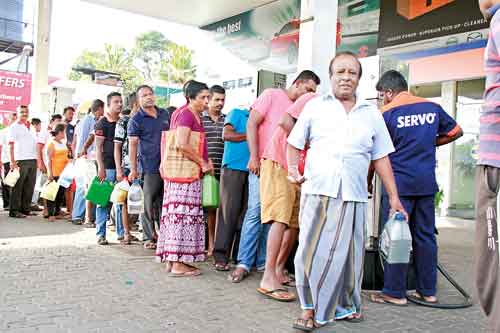Letters to the Editor
View(s):We have a right to breathe unpolluted air
Earnest pleas and protests have no effect on the authorities; they do not breathe the polluted air; nor live with fly-infested food. Let the authorities have their luxury but please give us the opportunity to breathe fresh air.
People of Hendala, Kerawalapitiya, Bopitiya, Uswetakeiyawa, Palliyawatte do not ask for riches nor other luxuries but for the right to breathe fresh, unpolluted air.
Nelum Hendala
Getting the best out of the fuel ‘crisis’

Long queues:Waiting for petrol. Pic by Athula Devapriya
The oil shortage was a blessing in disguise for me. In these times of traffic snarls by car it took 45 minutes for me to reach the office. Not having petrol and not willing to stay in long queues with a bottle in hand I opted to walk the six km to my office.The result was amazing. Whereas it took 45 minutes to office by car it took only 15 minutes more by foot, that is one hour and also I saved Rs 40 not to mention the good Doctor’s advice I complied with for the first time to walk one hour a day to keep fit.
Further at a time our rulers are short of ideas to reduce traffic congestion they can think of an easy way out using oil as a weapon since there is a direct link between the availability of oil and traffic as we experienced during the past few days. Thank you Minister of Petroleum Resources you have proved that there is a silver line in every dark cloud.
A.G. Weerasinghe Via email
Mushrooming condominium constructions and unanswered questions from affected residents
I would like to draw attention to an environmental hazard that has taken root in this country – high rise apartments and condominium constructions that are mushrooming in Colombo and the suburbs. The latest is a 333-unit condominium project “… without equal…” and one at Battaramulla.
You have to only look at Alwis Lane off de Saram Road in Mount Lavinia, Attapattu Lane, Frazer Avenue in Dehiwela, Maharagama, Battaramulla and very much everywhere in and around Colombo to see how this malaise has spread even to the outstations. Citizens have protested about the flouting of building regulations and the infringement of their rights but to no avail.
The residents of the lanes at Koswatte Talangama are the most recent victims of this environmental hazard and crass, callous disregard for the rights of the people who live in this area. In this instance, the developer had cleared the property and commenced construction without even obtaining UDA approval.
The apartment complex opens into a private lane whose width is not adequate for the number of units that are to be constructed. It is approximately 200 metres in length, is a dead end, and does not have a turning circle. Further, the Talangama Police Station that is located on this lane uses it as an unofficial parking lot and sometimes vehicles that have been seized or had met with accidents are also parked along this lane as well as on the main road.
The complex does not have direct access to the main two-lane Kalapaluwawa Road on which vehicles from Malabe and Kaduwela as well as traffic from the highways, buses and trucks ply. The existing traffic congestion, especially during rush hours, will be aggravated manifold due to an increase in the number of vehicles that will enter the Kalapaluwawa Road from this lane.
Though the residents of Koswatte, Battaramulla petitioned the UDA as well as other relevant agencies against its construction, approval had been given in spite of innumerable telephone calls meetings with the enforcement officer. How the UDA subsequently gave approval for the construction despite the written complaints submitted to it as well as other relevant agencies by residents of the area is puzzling.
We urge the Minister in charge to inquire into how approval was given for the construction of this apartment complex.
We also urge the authorities to conduct a full review of the condominium business from the perspective of not only of developers and their capital but also the impact such ‘development’ has on the rights and quality of life of a vast majority of the people. It is also time for the development of a national policy on the construction of these resource gobbling condominium complexes that cater to the affluent.
An affected resident Koswatte, Battaramulla
Roaring “thunder birds” a health hazard

A low flying airplane over Kochchikade
Lately, the airplanes taking off from the Bandaranaike International Airport have started to fly over densely populated areas of Negombo and Kochchikade at a very low altitude- only some 500 m above the ground. During the day, one can somehow tolerate the thundering sound of the engines but at night, especially around 3 a.m. two airplanes in succession of some 5-10 minutes interval, with their roaring sound over the roof-tops can really jolt you out of your bed. Even the ear-plugs are of not much help.
At 4.30 another “thunder bird” disturbs your sleep, so from 3 o’clock onwards one can take only cat-naps. The elderly suffer the most, as when they are awoken in the middle of the night, they find it difficult to fall asleep again.
International researchers have found that the sound pollution from the airplane engines in the radius of 20km from an airport causes heart ailments, high blood pressure and shortens the life span of the people living in that area. Can the airport and civil aviation authorities explain the necessity for the airplanes to fly at such a low altitude over Negombo and Kochchikade? Are these cost cutting efforts on fuel expenditure at the expense of the health and well-being of the people?
S.Mack Via email


